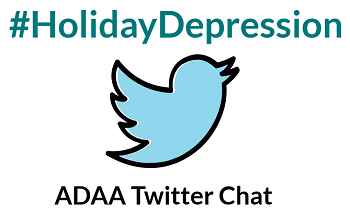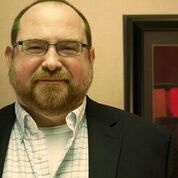ADAA Member Experts Share Tips for #HolidayDepression
ADAA Member Experts Share Tips for #HolidayDepression

On November 13, 2018, ADAA held a Twitter chat under the title #HolidayDepression. ADAA members Mary Alvord and Shane Owens answered questions on coping with depression during the holiday season.
Q1: How common is depression during the holidays?
Dr. Alvord: Stress of holiday expectations and gatherings can make it more difficult for those already experiencing clinical depression. For others, stress, increased sadness and anxiety are common during the holidays and are typically time-limited.
Dr. Owens: While holidays are related to an increase in feeling sad, anxious and stressed, rates of diagnosable depression likely do not increase. These feelings may be intense, but usually pass quickly after the holidays end. If they don’t, seek help.
Q2: What contributes to the stress of the holidays?
Dr. Alvord: Plan carefully, set clear boundaries & manage expectations. Give yourself the freedom to say “no” to invitations & requests that aren’t in line with your values. Be careful of overindulging in food, alcohol & requests to stay “just a little longer.”
Dr. Owens: Negative stress comes mainly from unrealistically high expectations for yourself and your experiences. Many people think they must do things close to perfectly in a very short time. Also, we often skip exercise, good diet and good sleep.
Q3: What can I do to get ready to face the challenges that naturally come from dealing with depression during the holidays?
Dr. Alvord: Get adequate sleep to think clearly, make better decisions and feel less irritable. Stay engaged/active and don’t withdraw/avoid, but take breaks when needed. Be proactive and plan ahead. Seek support. Help others. Visualization.
Dr. Owens: Plan carefully, set clear boundaries and manage expectations. Give yourself the freedom to say “no” to invitations and requests that aren’t in line with your values. Be careful of overindulging in food, alcohol and requests to stay “just a little longer.”
Q4: What can you do to prepare yourself knowing you are about to encounter a "new holiday" after the loss of a loved one, divorce, difficult family member visiting, etc.?
Dr. Owens: Balance old and valued traditions with new ones. While many families have practices that span generations, holidays are enriched by embracing change. If dealing with loss, think about what that person might want and plan that part of the gathering ahead of time. If dealing with a difficult family member, balance setting healthy boundaries with embracing holiday traditions of being together and finding joy in that. Putting them in charge of party tasks can work, too. More on this idea here.
Dr. Alvord: It is normal to feel sad, perhaps even spacey after losses. Be kind to yourself. Reach out for support. You are not alone. For difficult family interactions, identify previous triggers and plan realistic options, like activities that you can share.
Q5: Is there a way to preempt the situational depression without medication?
Dr. Alvord: CBT provides strategies. Behavioral Activation: schedule something pleasurable, or just move your body. Reframe your thoughts to change emotions, body and action. Promote resilience. I think it was Dr. Dan Hoffman who asked about behavioral activation. An important technique in cognitive behavioral treatment of depression. Determine what you value, what activities you like to do (or used to like before you were depressed) and schedule some. Make sure to move; get out for a walk.
Dr. Owens: Practicing asking yourself 4 questions when dealing with difficult emotions can help:
What am I feeling?
What am I thinking that might cause that feeling?
Does that thought make sense?
What other thought might make sense?
If you happen to be taking medication, though, stick with your doctor’s orders, make sure you have enough medication to last through any travel, and carry copies of your prescriptions and your prescriber’s phone number just in case.
Q6: What are some resources that can help me cope with my depression and stress during the holiday season?
Dr. Alvord: ADAA, Grief & Depression, SAMHSA holiday stress/trauma, Resilience guide for children and teens, Holiday stress resource center and 1-800-662-HELP
To add, as Mr. Rogers said, look for the helpers, and be a helper when you can. We are all on this earth together, and there are people and resources to turn to. Seeking help and helping are protective factors of resilience.
Dr. Owens: First of all, our host ADAA has tremendous resources to help you with anxiety, depression and stress throughout the year. Also, ABCT and APA Help Center have resources to help you cope with all manner of difficult thoughts, emotions and behavior.













